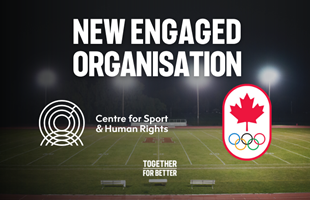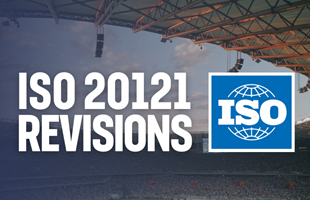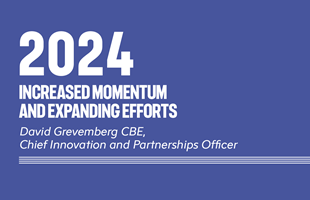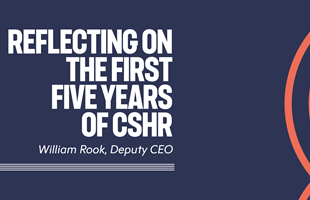Play the Game Blog: Harmonious Development of Humankind
12 Aug 2019
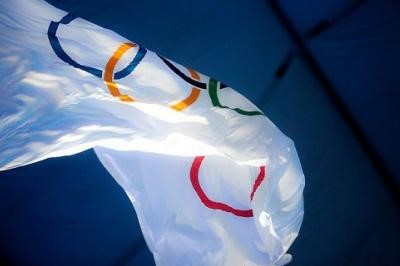
Sports organisations like to see themselves as promoters of social development and high ethical standards. But sport must also actively avoid harm and improve the human rights situation wherever sport is linked to risks and abuses. Sylvia Schenk writes on the higher expectations that sports organisations meet nowadays.
If it is about ambitions, sports organisations tend to think big. Take the Olympic Charter[1] and its Fundamental Principles of Olympism[2]:
"Olympism seeks to create a way of life based on social responsibility and respect for universal fundamental ethical principles" and its "goal is to place sport at the service of the harmonious development of humankind, with a view to promoting a peaceful society concerned with the preservation of human dignity”.
The Olympic movement, comprising the International Federations (IF), National Olympic Committees (NOC), and other organisations recognised by the International Olympic Committee (IOC), has to comply with the Olympic Charter. So, one should expect that human rights are high on the agenda in international sport. And indeed, the Fundamental Principle number 4 states "The practice of sport is a human right." while number 6 prohibits all kind of discrimination.
No doubt – the IOC and its constituents promote and support sport for all as well as the development of athletes all over the world, and have, step by step, opened doors for discriminated and vulnerable groups, thus engaging for diversity. Aiming at 50 % women at the Olympic Games[3] (with female athletes from all participating countries, albeit its effect seen controversially[4]), the Paralympics demonstrating the admirable abilities of persons with disabilities, and the Refugee Team at the Olympics 2016 in Rio de Janeiro are examples that send important signals, having an impact even beyond sport.
Increased scrutiny
Nevertheless, the Olympic movement has come under increased public scrutiny with regard to its human rights track record in recent years. This is also a consequence of the United Nations Guiding Principles on Business and Human Rights (UNGP)[5], approved in 2011, confirming that the states' obligation "to protect and fulfil human rights"[6] must be completed by the responsibility of "business enterprises" … "to respect human rights"[7]: They should “avoid infringing on the human rights of others and should address adverse human rights impacts with which they are involved."[8].
This has put the business sector as an actor in the field of human rights continuously under pressure, especially when catastrophes like Rana Plaza in April 2013, killing more than 1,000 workers in Bangladesh[9], led to campaigns as well as law suits by trade unions and non-governmental organisations.
Do no harm is an obligation
So, while the sports organisations during the first half of this decade continued to focus on the good sport can do, the global approach towards responsibility of non-state-actors was broadened by the UNGP. Risk assessment, prevention, and remedy – for abuses occurring despite prevention measures being in place – are seen as an obligation. Whatever a company's business entails, the overall requirement is "Do no harm!", meaning that doing good in some aspects cannot outweigh harm done in other areas: Inviting a refugee team to Rio is fine, having Favelas evicted to build the Olympic village[10] is not and undermines anything else the IOC – and/or an Olympic host – is doing.
No wonder that the contribution of sport to, among others, empowerment and health, and its acknowledged role as an "enabler of sustainable development" in the UN's 2030 Agenda for Sustainable Development[11] does no longer suffice to fulfil the human rights responsibilities. Higher expectations regarding the human rights activities of companies raised the bar as well for sport organisations. Not only because major sports events like the Olympics, the FIFA World Cup, and UEFA EURO are big business with the sports organisations behind them earning a lot of money. For the ‘autonomy of sport’, a principle the IOC and others defend rigorously, responsibility is a prerequisite as stated by the European Union in the Commission's Communication on Developing the European Dimension in Sport 2011[12] and confirmed by IOC-President Dr. Thomas Bach in a speech delivered to the UN General Assembly 2013[13].
This leads to the conclusion that sports organisations have the same – or, given their high ambitions, even greater – obligation to respect human rights as the business sector.
The United Nations Guiding Principles on Business and Human Rights (UNGP)
First of all, the UNGP do not contain any new rights – they are based on the International Bill of Human Rights (consisting of the Universal Declaration of Human Rights, the International Covenant on Civil and Political Rights and the International Covenant on Economic, Social and Cultural Rights), existing UN conventions on Women's Rights, Children Rights etc.[14], and the International Labour Organisation’s Declaration on Fundamental Principles and Rights at Work[15].
Secondly, the UNGP define the scope: A business enterprise is not only responsible for "adverse human rights impacts" it is "causing or contributing to" through its own activities, including acts and omissions[16]. It must also "seek to prevent or mitigate adverse human rights impacts" directly linked to it, even if it has "not contributed to those impacts"[17]. The responsibility covers all business relationships, for example within the supply chain.
Thirdly, the UNGP are about implementation, listing concrete steps for how companies can live up to their obligation. It starts with a leadership commitment and a comprehensive risk assessment. It is not expected (and usually not possible/helpful) to work on all risks and/or negative impacts at once. One has to set priorities with regard to the most salient risks on the one hand and measures with specific great impact, i.e. that can easily make a big difference for affected individuals, on the other. Internal and external stakeholders should be involved in the whole process[18].
Finally, this should feed into a human rights policy and a detailed programme, including – beside prevention measures – grievance mechanisms, continuous monitoring of initiatives taken, reporting and effective remedy[19]. To ‘mainstream’ human rights in daily operations, i.e. making it an integral part of corporate governance, is the overwhelming task.
Adaption to sport
The same applies for sports organisations: Make respect for human rights a natural element of Good Governance.
The UNGP can be easily adapted as done by FIFA, the first International Federation approving a human rights policy in line with the UNGP in 2017[20], ever since striving to include a human rights-based approach in all its activities with some important steps already fulfilled.
Also in February 2017, the IOC, after consultation with the Sport and Rights Alliance[21], added "a section designed to strengthen provisions protecting human rights and countering fraud and corruption related to the organisation of the Olympic Games", expressively mentioning the UNGP, to the new Host City Contract[22]; in September 2018 the IOC based its Supplier Code on the UNGP[23], and is currently, supported by experts, developing its human rights policy.
The UNGP cover a wide range of topics already discussed and dealt with in sport, for example racism (e.g. in football[24]), discrimination of women (e.g. the use of hijabs in competition[25]), sexual abuse (e.g. the ‘Nasser case’ in Gymnastics in the United States[26] or initiatives regarding child safeguarding[27]). So, no sports organisation has to reinvent the wheel but can use the new instrument to identify gaps and take a systematic approach. Already initiated programmes (e.g. anti-racism campaigns, gender and safeguarding activities) can be integrated, complemented, and improved. This will not only give clear guidance internally but also enhance the profile externally.
While this seems to be easy, the Olympic movement still struggles to involve stakeholders, especially the most important group: The athletes. Their human and labour rights being heavily affected by any decision of the IOC, IF and NOC – e.g. anti-doping-system[28], eligibility questions[29] make it necessary to develop a system of representation that guarantees the right to a say for all types of athletes[30].
With regard to major sports events the entire life cycle of the event has to be covered – not just the period between the opening and closing ceremony. Injured or killed workers on construction sites due to insufficient safety measures (e.g. caused by time pressure to get ready for the event)[31], detained protesters or journalists[32], discrimination of LGBT+ individuals[33], forced evictions[34] – all these are examples of human rights risks that can be directly linked to the sport organisation responsible for the awarding of the event to the specific host.
To apply the UNGP does not necessarily lead to the exclusion of countries from hosting, but requires bidding criteria[35] and host contract clauses that oblige the host city/country/organising committee to respect human rights. This must be followed by an action plan for the organisation and delivery of the event, e.g. as laid down in the successful United Bid for the FIFA World Cup 2026[36], and close monitoring.
Challenge and opportunity
The biggest challenge in this context remains how to deal with politics.
No one expects sports organisations (or business enterprises) to solve all the world's problems, to campaign against a government or organise protests. The ability to uphold, even to open dialogue in hostile situations, is an advantage of international sport[37]. But diplomacy as the best option must be grounded on a consistent attitude on human rights. To find the right balance between talks behind closed doors (in order not to embarrass a government and even worsen the problem) and a clear stand in public (to avoid ‘sportwashing’[38] and gain the trust of affected groups) will not always be easy. This has been demonstrated in 2019 in the Hakeem al-Araibi case[39] where joint but varying efforts including FIFA, IOC, governments and civil society finally led to a solution[40].
This also has been the first test for the newly established Centre for Human Rights and Sport[41] that under the leadership of CEO Mary Harvey convened a series of conference calls with all actors from sports organisations to governments and non-governmental organisations.
The huge global attention the leading sports organisations enjoy and which they gladly use to find generous hosts for their events and make money from sponsors and broadcasters gives a leverage that can and must be used to avoid harm and improve the human rights situation wherever sport is linked to risks and abuses. To seize this opportunity not just for sport but for the "harmonious development of humankind" will make the Olympic movement walk the talk.
References
[1] https://stillmed.olympic.org/media/Document%20Library/OlympicOrg/General/EN-Olympic-Charter.pdf#_ga=2.105015818.862704357.1564476928-905398718.1561990971
[2] Olympic Charter, page 11
[3] https://www.olympic.org/women-in-sport/background
[4] https://www.care2.com/causes/saudi-arabia-hooray-for-female-olympic-athletes.html
[5] https://www.ohchr.org/Documents/Publications/GuidingPrinciplesBusinessHR_EN.pdf
[6] UNGP (FN 5), general Principles (a)
[7] UNGP (FN 5), General Principles (b)
[8] UNGP (FN 5), II.A.11
[9] https://www.ilo.org/global/topics/geip/WCMS_614394/lang--en/index.htm
[10] https://www.independent.co.uk/news/world/americas/rio-2016-olympics-favela-shanty-towns-evicted-brazil-a7168221.html
[11] https://www.un.org/ga/search/view_doc.asp?symbol=A/RES/70/1&Lang=E– Number 37
[12] https://eur-lex.europa.eu/legal-content/EN/TXT/PDF/?uri=CELEX:52011DC0012&from=EN
[13] https://www.olympic.org/news/historic-milestone-united-nations-recognises-autonomy-of-sport
[14] https://www.humanrights.ch/en/standards/un-treaties/getting-started/
[15] https://www.ilo.org/declaration/thedeclaration/textdeclaration/lang--en/index.htm
[16] UNGP (FN 5), Number 13 (a)
[17] UNGP (FN 5), Number 13 (b)
[18] UNGP, (FN 5), Numbers 18 (b), 20 (b)
[19] UNGP (FN 5), Number 15
[20] https://resources.fifa.com/mm/document/affederation/footballgovernance/02/89/33/12/fifashumanrightspolicy_neutral.pdf
[21] https://www.fanseurope.org/en/activities/die-sport-and-rights-alliance.html
[22] https://www.olympic.org/news/ioc-strengthens-its-stance-in-favour-of-human-rights-and-against-corruption-in-new-host-city-contract
[23] https://www.olympic.org/-/media/Document%20Library/OlympicOrg/IOC/What-We-Do/celebrate-olympic-games/Sustainability/Spheres/IOC-Supplier-Code-Final.pdf
[24] https://www.independent.co.uk/topic/racism-in-football
[25] http://en.thegreatermiddleeast.com/2017/01/hijab-ban-in-basketball-will-they-lift-it/
[26] https://www.nbcnews.com/news/us-news/gymnastics-doctor-larry-nassar-hit-new-sex-abuse-claim-n698741
[27] https://www.fifa.com/about-fifa/who-we-are/videos/coming-soon-launch-of-the-fifa-child-safeguarding-programme-and-toolkit
[28] https://www.wada-ama.org/en/media/news/2018-01/wada-welcomes-echr-decision-to-back-whereabouts-rules
[29] https://www.cbc.ca/sports/iaaf-caster-semenya-human-rights-1.5115453
[30] https://www.insidethegames.biz/articles/1077561/german-athletes-group-steps-up-call-for-increased-representation-and-bigger-share-of-olympic-revenue
[31] https://egyptindependent.com/tokyo-olympic-construction-race-raises-worker-safety-questions/
[32] https://www.theguardian.com/world/2015/may/15/azerbaijan-european-games-khadija-ismayilova
[33] http://theconversation.com/world-cup-russia-isnt-safe-for-lgbt-fans-and-qatar-2022-will-be-worse-99540
[34] https://www.business-humanrights.org/en/russia-human-rights-watch-launches-alternative-torch-relay-map-to-highlight-human-rights-abuses-related-to-2014-sochi-olympic-construction#c76933
[35] https://www.hrw.org/news/2018/06/12/fifa-2026-world-cup-bids-test-reforms
[36] https://resources.fifa.com/image/upload/proposal-for-a-united-human-rights-strategy-united-2026-bid.pdf?cloudid=s2xnrvfjg9kp0zelhxnt
[37] https://www.history.com/news/ping-pong-diplomacy;https://www.ittf.com/foundation/programs/pingpong-diplomacy/
[38] https://www.independent.co.uk/voices/tour-de-france-brussels-grand-depart-cycling-ineos-uae-bahrain-a8988741.html
[39] https://www.theguardian.com/football/2018/dec/06/hakeem-al-araibis-case-is-a-true-test-of-fifas-new-human-rights-policy;https://www.fifa.com/about-fifa/who-we-are/news/fifa-statement-on-hakeem-al-araibi; https://www.bbc.com/sport/football/46995272
[40] https://www.fifa.com/about-fifa/who-we-are/news/fifa-statement-on-hakeem-al-araibi-x3480
[41] https://www.sporthumanrights.org/
